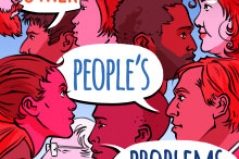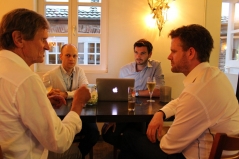Doing ill for ‘the greater good’: Understanding what really went on in the Stanford Prison Experiment
Doing ill for ‘the greater good’: Understanding what really went on in the Stanford Prison Experiment
Just about every highschool and college psychology textbook offers extensive coverage of Zimbardo’s Stanford Prison Experiment (SPE). The meaning of the SPE seemed obvious — that when given roles with power , people naturally become brutal tyrants. This message has had lasting influence, not only in psychology but in the world at large. However, after researchers have recently gained access to the SPE archives, it has come to light that much of what we thought we knew about the study... / more
Wait, What?! The Stanford Prison Experiment was pre-tested?
Wait, What?! The Stanford Prison Experiment was pre-tested?
With the recent news regarding the questionable nature of the infamous Stanford Prison Experiment, we thought it was purdent to republish one of our earlier blog articles drawing attention to the issue. The piece below appeared on our blog in 2012. A blogpost by the Neurocritic suggests that the infamous Stanford Prison Experiment (SPE) was based on a pre-test in which participants behaved equally cruel. Job van Wolferen summarizes this post and highlights another disturbing point the Neurocritic raises: the... / more
The Violence We Have Committed

keywords:
immigration, politics, child psychology, current events
The Violence We Have Committed
Circle of Willis is a podcast series from Associate Professor and Clinical Psychologist Dr. James Coan. The podcast features interviews with many of today's top social scientists, journalists, authors, and more. In a recent special episode of Circle of Willis, Dr. Coan speaks with five developmental scientists about what may be happening to the children who are currently being separated from their parents as part of a policy to deter immigration and asylum seekers at the southern border to the... / more
Chemical or Financial Imbalances? Mental Health, Income Inequality & American Culture
Chemical or Financial Imbalances? Mental Health, Income Inequality & American Culture
As societies become more unequal, the prevalence of all forms of mental illness increase—in part—due to the perception of extreme differences in status. The rise of mood disorders is caused by our social immersion in a digital culture—built and shaped via individualistic values—which is the financial machine for perpetuating income inequality. Psychiatry is reliant on a decontextualized, ahistorical, brain-based understanding of mental disorders to garner wide-spread acceptance of biological solutions (i.e., psychotropic medication). Psychological disorder however, may manifest via financial... / more
Demystifying Mental Health...On the Radio! An interview with podcast host Hillary McBride
Demystifying Mental Health...On the Radio! An interview with podcast host Hillary McBride
“I like to tell people when I start working with them that I’m a therapist because therapy has changed my life. As a therapist, I know what it’s like to be on both sides of the couch." Normally, therapy sessions are totally confidential — but a new podcast from the CBC opens the doors. Hillary McBride and her clients want to help demystify mental health. No actors. No auditions. No artifice. In-Mind sat down with Hillary, a therapist and Ph.D... / more
Does social media usage really make people miserable? Fact-checking claims about the psychology of Facebook

keywords:
social media, Facebook, well-being, happiness, mental health
Does social media usage really make people miserable? Fact-checking claims about the psychology of Facebook
There’s been a lot of talk in the news recently about Facebook, and much of the discussion has centered on Facebook’s role in politics and journalism and user privacy. But there are other discussions about Facebook’s product itself, focusing on users’ well-being and psychological health . Specifically, some political commentators are making somewhat inaccurate and exaggerated claims about the psychology of Facebook—that it’s unhealthy, making users feel depressed and/or lonely. It’s important that we think critically about this topic, so... / more
In-Mind Selected as a Top Psychology Blog!
In-Mind Selected as a Top Psychology Blog!
In-Mind Magazine was selected by Feedspot as one of the top 15 psychology blogs on the web! https://blog.feedspot.com/social_psychology_blogs/ / more
"We are ready to move!" An interview with Daniel Lakens and Klaus Fiedler on the current challenges in the field of psychological research
"We are ready to move!" An interview with Daniel Lakens and Klaus Fiedler on the current challenges in the field of psychological research
Can psychological research still be trusted? In-Mind interviewed Daniel Lakens and Klaus Fiedler-two of the most prominent voices in the debate on how psychological science can be improved. In this interview, they offer a personal view on how psychology has changed and how it should change in the future. They describe their personal motivation and how the debate has affected their own work. Distrust in science is on the rise. Whether it concerns climate change or creationism, politicians such as... / more
Invoking Pocahontas: An act of racism disguised as politics

keywords:
racism, prejudice, Native American, Donald Trump
Invoking Pocahontas: An act of racism disguised as politics
At a recent event honoring Navajo Code Talkers who are World War II Veterans, President Donald Trump stated, "You were here long before any of us were here. Although we have a representative in Congress who they say was here a long time ago. They call her Pocahontas" [1] . This was not a first offense, as Trump has a history of referring to Senator Elizabeth Warren as Pocahontas. Trump’s “name calling” stems from Warren’s (albeit controversial) identification as Cherokee... / more
The Force is Too Strong with This One? Sexism, Star Wars, and Female Heroes
The Force is Too Strong with This One? Sexism, Star Wars, and Female Heroes
The newest installment of the Star Wars saga, The Last Jedi , was released last month. Despite critical success, the film has been met with a polarized audience reaction online. Although likely not the primary reason for polarization, some of the negative reaction can be attributed to the perceived progressive, feminist political message of the main characters [1] : The primary protagonist, Rey, is a woman; the two most prominent White men, Kylo Ren and General Hux, are villains. Behind... / more







